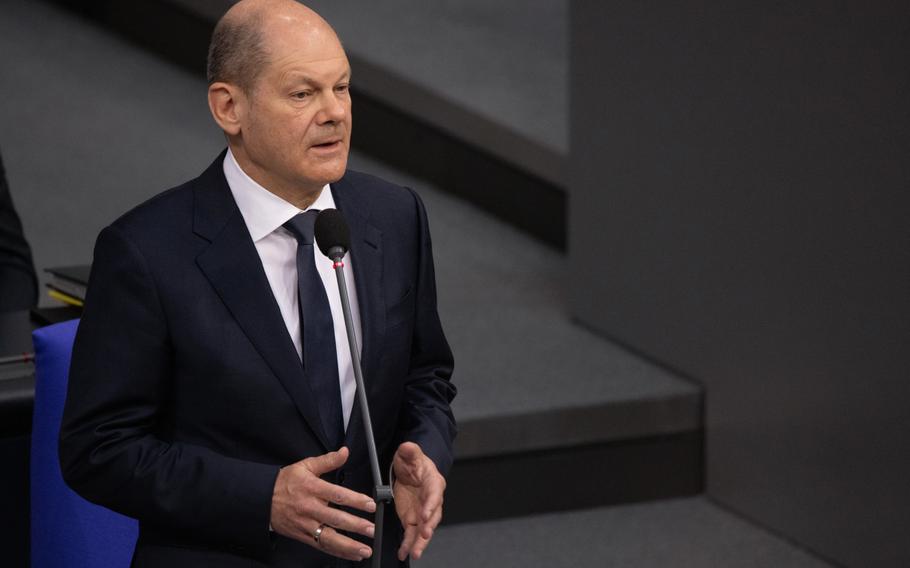
Olaf Scholz, Germany’s chancellor, speaks at the Bundestag in Berlin, Germany, on April 6, 2022. (Liesa Johannssen-Koppitz/Bloomberg)
German Chancellor Olaf Scholz plans to invite Indian Prime Minister Narendra Modi as special guest to a Group of Seven leaders' summit next month as part of an effort to forge a broader international alliance against Russia.
Germany, which currently holds the rotating G-7 presidency, will also welcome the leaders of Indonesia, South Africa and Senegal to the gathering in the Bavarian Alps June 26 to June 28, Scholz's spokesman, Steffen Hebestreit, said Monday at a regular news conference in Berlin, confirming a Bloomberg report published Sunday. The German leader is hosting Modi for talks in Berlin later on Monday and there will also be a joint German-Indian cabinet meeting.
Despite concerns over the prime minister's reluctance to condemn Russia's invasion of Ukraine and a recent jump in India's fossil-fuel imports from Russia, Scholz decided the G-7 should court India, according to people familiar with the matter.
Given India's growing population and long democratic tradition, Germany sees the country as a potentially valuable partner in efforts to isolate Russia, said the people, who asked not to be identified because the discussions are confidential. Scholz also sees an opportunity to work closely with Modi in other policy areas such as climate change and defense.
The German government wants to strengthen bilateral ties with India in the coming years and also supports the European Union's efforts to embrace the country by offering economic incentives, which could help it rethink its ties to Russia, the people added.
In their meeting on Monday, Scholz and Modi will discuss how to further ease immigration rules for skilled workers from India to tackle labor shortages in Europe's largest economy, and how to accelerate technology transfer to India in the push to reduce climate-damaging carbon emissions.
In the medium term, Germany also wants European defense companies to offer India an alternative to Russian weapons deliveries, as a way to reduce its reliance on Moscow.
German business is skeptical about dealmaking with India. The country's neutral stance on Russia complicates Scholz's efforts to strengthen economic and political ties, said Wolfgang Niedermark, board member of Germany's powerful BDI industry association.
"The West must reckon that India will not align itself with any camp in an increasingly bipolar world order," he said, adding that the EU and Germany should make offers to India without betraying their own interests.
Germany and India should both reduce dependencies on Russia. "This applies to European energy imports as well as to Russian-Indian military cooperation," Niedermark said.
Following Russia's invasion of Ukraine, Scholz is looking to deepen connections with other democratic countries. That's why the 63-year-old Social Democrat picked Japan for his first trip to Asia as chancellor last week, instead of following recent tradition and traveling to China with a business delegation.
India was among the more than 50 countries that abstained from a United Nations vote to suspend Russia from the UN Human Rights Council in April. It hasn't imposed sanctions on Moscow over the war in Ukraine and instead is boosting energy imports. India is also a significant buyer of Russian weapons.
Indian Foreign Secretary Vinay Kwatra said in a media briefing on Sunday that Modi will "exchange perspectives" on the war in Ukraine during his visit to Germany, France and Denmark.
Germany and its G-7 allies, including the U.S., U.K., France, Italy, Japan and Canada, have imposed sweeping sanctions on Russia, but few other countries have joined those efforts — and many governments in Latin America, Africa, Asia and the Middle East remain reluctant to do so.
The seven governments have been coordinating efforts to engage key countries, and India is high on that list. The EU last month relaunched trade negotiations in the hope of providing it with a viable alternative to diversify away from Russia.